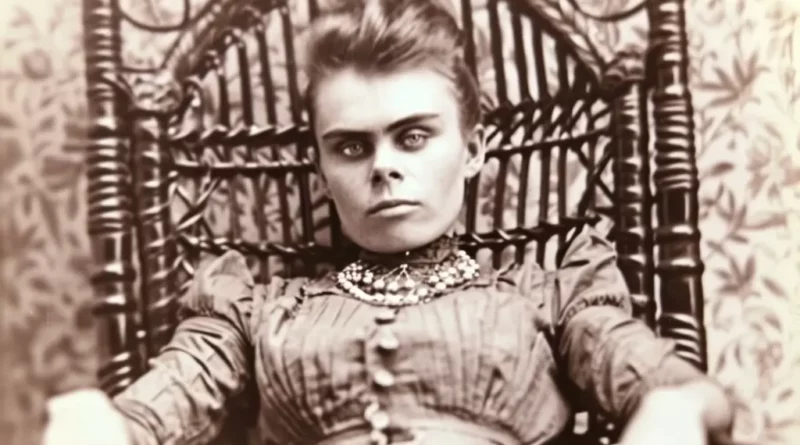Lizzie Borden Brutal Axe Murders in Fall River Massachusetts
On a hot summer morning in Fall River, Massachusetts, August 4, 1892, the calm domestic life of one household shattered into a tale of blood, suspicion, and unspeakable violence. The brutal murders of Andrew and Abby Borden, committed within the walls of their home at 92 Second Street, gripped the nation in horror. The chief suspect? Their own daughter, Lizzie Borden.
Over 130 years later, the case remains one of America’s most notorious unsolved crimes, steeped in folklore and forever entwined with a sinister nursery rhyme. Though Lizzie Borden was acquitted, the cloud of guilt never fully lifted. This article explores the full, intricate story—from family tensions to courtroom drama and lasting cultural impact—of a crime that shocked the Victorian world.
Life in the Borden Household
Lizzie Andrew Borden was born on July 19, 1860, the younger daughter of Andrew Jackson Borden, a wealthy but famously frugal businessman, and Sarah Anthony Morse. After Sarah’s death when Lizzie was a child, Andrew remarried Abby Durfee Gray, a woman his daughters never fully accepted. Lizzie and her sister Emma resented their stepmother and believed she had married Andrew for his wealth.
Despite his financial success in property and manufacturing, Andrew kept his family living in a modest, outdated home without indoor plumbing, far from the fashionable neighborhood known as “The Hill.” This strict austerity created tensions in the household, especially with his independent, socially ambitious daughters.
By the 1890s, these simmering hostilities had reached a boiling point. Arguments became more frequent, and the once-rigid structure of the household began to deteriorate.
The Day of the Murders: August 4, 1892
The morning of Thursday, August 4, 1892, began like any other for the Bordens. At around 9:00 AM, Abby Borden went upstairs to make the bed in the guest room. There, she was attacked from behind—struck with a hatchet at least 18 times, primarily to the back of the head. Investigators later concluded that she had turned to face her attacker after the first blow, which caught her near the ear. She fell forward, and the remaining blows followed.
Less than two hours later, Andrew Borden returned from his morning walk. When he found the front door locked, the maid, Bridget Sullivan, let him in. Bridget testified she heard Lizzie laughing from the top of the stairs around that time—strangely calm, considering Abby’s body lay just feet away in the upstairs room.
At 11:10 AM, Lizzie called for Bridget, exclaiming that her father had been murdered in the sitting room. Andrew had been brutally struck 10–11 times in the head with a sharp weapon, most likely a hatchet. His skull was crushed and his face nearly unrecognizable.
Police arrived within minutes. What they discovered would soon launch one of the most sensational trials in American legal history.
The Crime Scene and Initial Investigation
The gruesome crime scene shocked the officers. There were no signs of forced entry or robbery, and the savagery suggested personal rage rather than opportunistic violence.
Suspicion quickly turned to Lizzie, who had remained calm and emotionless during questioning. Her stories about her whereabouts changed multiple times. At one point, she claimed she had been in the barn searching for lead sinkers to go fishing. Yet detectives found no footprints or evidence of disturbance in the dusty barn.
The family maid, Bridget, was resting in her attic room at the time of the murders and was ruled out as a suspect. Emma Borden was out of town, and no one else was known to have entered the house that morning.
Investigators also found that Lizzie had attempted to buy prussic acid (a deadly poison) the day before the murders but had been refused by the pharmacist. Days after the killings, Lizzie was seen burning a dress, claiming it was stained with paint—though some suspected it bore blood from the crime.
All this circumstantial evidence began to form a compelling case, despite the absence of eyewitnesses or a clear murder weapon.
The Arrest and Pretrial Proceedings
Lizzie was arrested on August 11, 1892, a week after the murders. The news exploded across the nation, and Fall River quickly became a media circus. The idea of a respectable, unmarried Victorian woman committing such gruesome crimes fascinated and disturbed the public.
During the inquest, Lizzie’s answers were evasive, contradictory, and at times bizarre. However, her defense claimed this behavior resulted from the morphine prescribed to her for stress.
Lizzie pled not guilty. The stage was set for a courtroom showdown that would enthrall America.
The Trial of the Century
The trial began on June 5, 1893, in New Bedford, Massachusetts. Over 160 people were subpoenaed. The prosecution focused on motive, opportunity, and Lizzie’s inconsistent alibi. They argued that Lizzie had killed Abby first while Andrew was out, and then murdered her father to prevent him from discovering the crime.
Key points of the trial included:
- The bloody hatchet found in the basement, which was thought to have had its handle removed.
- Lizzie’s burned dress, likely stained with blood.
- Her inconsistent statements to police.
- The alleged purchase attempt of poison before the murders.
However, the defense team, led by George D. Robinson, a former Massachusetts governor, presented a formidable argument. They highlighted the lack of physical evidence, the absence of blood on Lizzie herself, and the fact that she had no history of violence. Witnesses testified to her good character, and the judge instructed the jury to consider that a woman might not be capable of such violence.
After just 90 minutes of deliberation, the jury returned a not guilty verdict. Lizzie Borden walked free.
Public Reaction and Life After the Trial
Despite her acquittal, Lizzie was never accepted again in Fall River society. The court of public opinion had its own verdict—many believed she got away with murder.
She and Emma moved into a large Victorian mansion they named Maplecroft in an upscale neighborhood. Lizzie attempted to reinvent herself, socializing with theater folk and even changing her name to Elizabeth Andrews Borden.
In 1905, after a falling out, Emma moved away. The sisters never spoke again. Lizzie lived in relative seclusion until her death from pneumonia on June 1, 1927, at the age of 66. Emma died just days later.
Cultural Impact and the Power of a Rhyme
The Lizzie Borden case became the subject of books, plays, TV shows, movies, and even a ballet. However, perhaps nothing sealed her fate in American folklore like the chilling rhyme:
Lizzie Borden took an axe
And gave her mother forty whacks
When she saw what she had done
She gave her father forty-one.
Although wildly inaccurate—Abby received 18 blows, and Andrew 10—the rhyme encapsulated the macabre fascination with the case. Generations grew up hearing it, often unaware of the details behind the legend.
The Borden home is now a bed-and-breakfast and museum, where visitors can sleep in the very rooms where the murders took place. Some believe the home is haunted, reporting mysterious voices, footsteps, and sightings of apparitions.
Unsolved or Forgotten?
To this day, the murders of Andrew and Abby Borden remain officially unsolved. While Lizzie remains the prime suspect, alternative theories abound:
- Could Bridget the maid have snapped after years of mistreatment?
- Was a stranger or disgruntled business associate responsible?
- Was Lizzie protecting someone else?
Without a confession or new forensic evidence, the truth may never be known. But the mystery continues to capture imaginations across the world.
Conclusion
The Lizzie Borden case is not just a tale of murder—it’s a study of gender, class, media, and justice in 19th-century America. The enduring fascination with the case stems not just from its brutality, but from its psychological complexity and cultural resonance.
Lizzie Borden’s story is a haunting reminder that justice is not always clear-cut, and that the shadows of the past continue to linger long after the final axe falls.
Discover more from City Towner
Subscribe to get the latest posts sent to your email.




